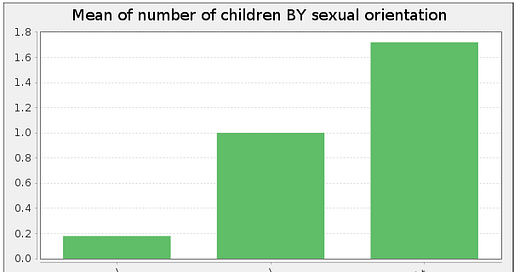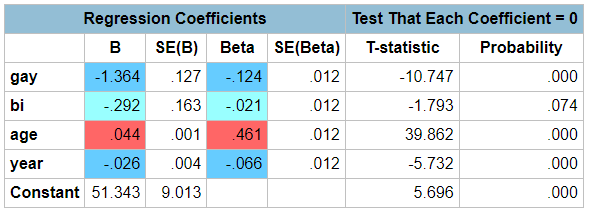
Sexual orientation is highly (though not perfectly) heritable. Which is a puzzle for evolutionary psychology. Historically, heterosexual activity was the sole method of human genetic reproduction. Even with assisted reproductive technology, heterosexual activity remains by far the main method of human genetic reproduction. Why, then, haven’t the non-straight genes been wiped out ages ago?
The simplest response is to doubt that sexual orientation matters much for fertility. Do we really know? Google Scholar is strangely silent on this issue, but the General Social Survey asks all the required questions to reach an answer. Its fertility question, CHILDS, is pretty clearly about biological children:
How many children have you ever had? Please count all that were born alive at any time (including any you had from a previous marriage).
Let’s start with the raw averages. Here is male fertility by orientation:
Here are the same results for females:
(N.B. If respondents’ fertility seems low, remember that the GSS asks about fertility so far. Many respondents are not yet done reproducing; some haven’t even begun).
The main result: Fertility differences by orientation are not merely visible, but gargantuan. Gay male fertility is almost 90% lower than straight male fertility. Gay female fertility is almost 75% lower than straight female fertility. Bisexual fertility, for both sexes, is roughly at the midpoint of the two extremes.
However, the General Social Survey currently runs from 1972 to 2021. During this time, age-adjusted fertility crashed and non-straight identity skyrocketed. Both long-run trends potentially distort the results. What if we statistically control for both age and year? Here are the regression results for males:
Here are the corresponding results for females:
For both gay men and women, controlling for age and year only slightly moderate the results. The age-adjusted fertility gap is almost 1.4 children for males and 1.1 children for females, versus raw differences around 1.5 children for males and 1.4 children for females.
For bisexuals, in contrast, the age and year adjustments matter more. Bisexual fertility is around .3 children lower for both genders, a deficit less than half of what we see in raw averages.
If fertility gaps of this magnitude prevailed historically, it is indeed hard to see how bisexuality, much less homosexuality, persists. The straightforward resolution: The gaps must have been much lower historically due to intense social and family pressure to marry and have children. Now that people in Western societies feel free to be themselves, non-straight genes will take a massive whittling over the next few generations. I am only a messenger.
Is there any rival story? The only one of which I am aware is “balancing selection.” The most famous example: Sickle-cell anemia is supposed to survive because one copy of the sickle-cell gene provides helpful malaria resistance, while two copies yield the deadly disease. We can imagine that gay genes work the same way: “Carriers” of gay genes could have higher fertility to offset the ultra-low fertility of actual gays. But this would require markedly higher fertility for gays’ close relatives to explain the facts. Google Scholar has a couple of supportive papers, but the story ultimately seems very far-fetched. Can being gay really cause your siblings to have a combined fertility surplus equal to twice your fertility deficit?
How depressed should gays and bisexuals feel about their genetic prognosis? Barely. If you plan to have zero biological kids, you already know that you will pass none of your genes onto the next generation. None of your genes for intelligence. None of your genes for personality. None of your genes for your passions. If none of that bothers you, why should the non-transmission of your genes for sexual orientation tip the scales? Sure, the far future will be very straight, but you won’t be there to feel like something special has been lost.




















Embedded into this is the assumption that there are genes for being gay similar to sickle cell genes. I think the fact that some people end up gay is likely a consequence of the fact that there's a very complicated dance of sexualizing hormones that have to trigger at just the right times in order to successfully influence these behaviors and preferences during fetal development as well as later in life.
It's easy to imagine that there's a real tradeoff: in order to have robust sexual drive in most of the population, there's a chance that things go "awry" (from the perspective of the genes, not morally) and you end up with a percentage of the population attracted to the opposite sex. You could of course imagine some completely new system for generating sexual drive that wouldn't have this problem, but evolution doesn't allow you to make big jumps like that. Small adjustments to the system for sexual drive that would move away from a population of gay people will cause overall lower fertility.
In fact this absolutely must be true since we see homosexual attraction in many species across the whole animal kingdom. Those strong selection pressures have been there all along. If this were the kind of thing that could be optimized away, it would already have been.
A good analogy here might be why men form useless nipples and breast tissue. Here the small cost of making those nipples (including a chance for cancer) is dwarfed by the advantage provided by having robust breast and nipple-making genes to pass on to their female offspring.
Also, it depends hugely on exactly how these traits are heritable. Let's take a model where there are 20 genes each of which increases your homosexuality a bit but anyone with less than 18 of them is straight. However, having more of those genes but less than 18 gives you a greater ability to understand what the opposite sex is likely to desire (I'm not saying this is the most likely explanation just a toy model to prove a point) and thus a reproductive advantage.
Since each of those genes undergoes positive selection in something like 95% of the population and negative selection in 5% of the population that could easily work out to net selective pressure for more such genes.
You can't just waive away the details of how the condition is heritable.